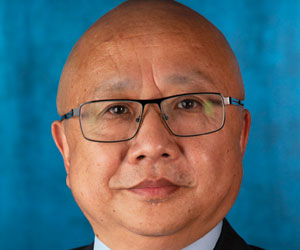
Why Pursue a Master's Degree in Artificial Intelligence
Prepare yourself with skills designed for the future in a multidisciplinary AI training environment that supports industry-readiness in AI subfields. Curated courses provide students with a repertoire of AI skills and tools for effectively solving problems in a specific domain and extend the knowledge to advance their own respective disciplines. Additionally, the master’s degree program offers thesis and non-thesis options that allow students to gain valuable experiences in cutting-edge research.
AI research activities and experimental facilities have been well-supported by various basic and applied research grants.

Prepare for a Career on the Cutting Edge of AI
By pursuing your master’s in artificial intelligence, you’ll have access to the program’s wealth of resources, dedicated support, and invaluable connections. Prepare for a successful career in AI through experiential learning, faculty expertise and prestigious research opportunities, just like Devin White.
Devin sets an inspiring example as one of the program’s first graduates. By engaging in hands-on learning and immersing himself in labs, White established a robust groundwork for his AI career. His involvement in research endeavors and networking with industry professionals prepared him to enter the workforce after graduation as an AI researcher.
Artificial Intelligence Tracks
MD/MSAI Dual Degree
Pioneer the future of AI and medicine like Aaron Fanous with the MD/MSAI Dual Degree—the first of its kind in the country. This innovative curriculum integrates medical education with AI training. During the initial three years, students focus on medical studies, followed by a dedicated fourth academic year to develop AI expertise. The fifth year culminates in a capstone project that leverages clinical data and mentorship from both disciplines.
Students interested in this program must be in their third year of medical school at the UT Health San Antonio Health Science Center Long School of Medicine when they apply for the MSAI program, and they must meet UT San Antonio admissions requirements.
College of AI, Cyber and Computing
This program is part of the UT San Antonio College of AI, Cyber and Computing, which advances expertise in artificial intelligence, cybersecurity, computing and data science to meet the needs of a rapidly evolving technology landscape. The college fosters interdisciplinary collaboration, applied research and engagement with industry partners to drive innovation and address real-world challenges.

Admission & Application Requirements
Applications are submitted through the UT San Antonio Graduate Application. Please upload all required documents (listed below) on your UT San Antonio Graduate Application. It is the applicant’s responsibility to ensure completion and submission of the application, a nonrefundable application fee, and all required supporting documents are on file with UT San Antonio by the appropriate application deadline.
| Artificial Intelligence (MS) | ||
|---|---|---|
| Required Degree | Bachelor's Degree from an accredited college or university in the United States or have proof of equivalent training at a foreign institution. | |
| Minimum GPA | 3.0 (on a 4.0 scale) Departments may consider GPA of last 60 semester credit hours | |
| Coursework | Completed adequate credit hours or foreign institution equivalent coursework as preparation for the program. | |
| Transcripts* | Required from all institutions attended; international transcripts must be recorded/translated to English | |
| Credential Evaluation | Required if you have earned university-level credit from foreign institutions. Submit an evaluation of your transcripts from FCSA or any NACES-approved credential evaluation agency. | |
| English Language Proficiency | 79 TOEFL iBT / 6.5 IELTS / Duolingo 100 For exams taken on or after January 21, 2026: We require a minimum TOEFL iBT score of 4.0. |
|
| Purpose Statement | Required | |
| Resume | Required | |
| Letters of Recommendation | 2 academic or professional reference(s) demonstrating your attributes for successful completion of this program (you will request these through the Graduate Admissions Application; let your recommenders know of your deadline to ensure submissions are on time) | |
| *Unofficial transcripts will be taken into consideration for admissions; however, if admitted into the program, you must submit official transcripts to the University. | ||
Application Deadlines
Applicants are encouraged to have their admission file completed as early as possible. All applications, required documents and letters of recommendation, if applicable, must be submitted by 5:00 PM U.S. Central Time on the day of the deadline. Deadlines are subject to change.
| Artificial Intelligence (MS) | |||
|---|---|---|---|
| Timing on Admission Decision: Completed applications will be reviewed for admission on a rolling basis. Decisions generally will be made and sent to applicants within 4 to 6 weeks of receiving the application. | |||
| Application Deadlines for: | Priority | International | Domestic |
| Spring 2026 | October 1 | December 1 | |
| Summer 2026 | Not Available | Not Available | |
| Fall 2026 | June 1 | August 1 | |
| Spring 2027 | October 1 | December 1 | |
| Summer 2027 | Not Available | Not Available | |
Funding Opportunities
ResourcesCareer Options
UT San Antonio prepares you for future careers that are in demand. The possible careers below are based on data pulled by a third-party tool called Emsi, which pulls information from sources like the U.S. Bureau of Labor Statistics, U.S. Census Bureau, online job postings, other government databases and more to give you regional and national career outlook related to this academic program.
Program graduates are working in various industrial positions at companies such as USAA, AMD, Microsoft, Oracle, Amazon, Samsung, NVIDIA, Qualcomm, and Intel.
Some of our MS graduates have been admitted to PhD Degree programs at universities including UT Austin, Purdue University, MIT, Rice University, and Texas A&M.
- Clinical decision support: Develop AI-powered tools to assist physicians in making accurate diagnoses, personalized treatment plans, and risk assessments.
- Medical research: Conduct AI and machine learning research to analyze large datasets, identify patterns, and develop predictive models for various diseases and health conditions.
- Precision medicine: Use AI algorithms to analyze patient data, including genomic information, to create personalized treatment strategies and targeted therapies.
- Medical imaging analysis: Develop and apply AI algorithms to interpret and analyze medical images, such as X-rays, CT scans, and MRIs, to improve diagnostic accuracy and efficiency.
- Drug discovery and development: Utilize AI to accelerate the drug discovery process, predict drug interactions, and optimize clinical trials.
- Healthcare management and administration: Apply AI techniques to streamline hospital operations, optimize resource allocation, and improve patient outcomes.
- Telemedicine and remote monitoring: Develop AI-enabled tools for remote patient monitoring, triage, and virtual consultations.
- Entrepreneurship and innovation: Create AI-driven healthcare startups or collaborate with technology companies to develop innovative solutions for the healthcare industry.
- Academic research and teaching: Pursue careers in academia, conducting research, and teaching at the intersection of medicine and AI.
- Clinical Informatics: Pursue positions as a chief information officer, or chief medical informatics officer, where the understanding of the computing technologies will permit detailed analysis of the enterprise data necessary for regulatory compliance, billing, and operational efficiency.
UT San Antonio has invested in a transdisciplinary AI Consortium that is a central hub for AI research in the greater San Antonio area, that houses ~65 researchers from 4 different organizations. Please visit us at https://ai.utsa.edu for further details on the cutting-edge research activities pursued in the consortium.



Graduate Advisor of Record - Intelligent and Autonomous Systems Track
Jeff Prevost, PhD
[email protected]